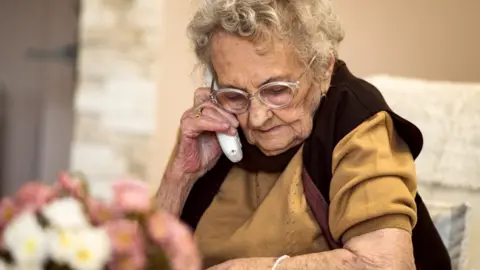Virgin Media probed over digital switchover rules
 Getty Images
Getty ImagesOfcom is investigating Virgin Media over its compliance with rules to protect vulnerable customers during the digital switchover.
The telecoms industry is currently changing landline services from analogue to digital.
But the regulator has concerns about how it could impact some people, for example those with telecare systems that rely on landlines.
Virgin Media said it was working closely with Ofcom and the government.
But it said other parties must also take responsibility.
"While telecoms companies like us have a crucial role to play in this switchover activity, it's essential that telecare companies and local authorities also step up and meet their responsibilities to ensure everyone receives the support they need," a spokesperson said.
The telecare systems typically work by having an emergency button which automatically calls the emergency services when pressed via a user's landline.
At present, they continue to work even during power cuts because traditional copper phone lines are normally unaffected by a loss of electricity.
It is feared that will change when telecare services are switched to digital lines, which could be vulnerable to power outages or internet drop-outs.
The communications regulator says it wants to look into Virgin Media's compliance in two areas:
- Rules around taking necessary measures to ensure uninterrupted access for customers to emergency organisations
- Rules on the fair treatment of vulnerable customers
In December, telecoms firms agreed to pause forcing customers on to the new digital phone network following a number of "serious incidents" involving the failure of personal telecare alarms.
On its investigation into Virgin Media, Ofcom said in a statement that it had "been clear" with telecoms firms that they must identify and support the vulnerable.
"A critically important function of the telephone network is to allow people, particularly vulnerable people, to contact the emergency services," the statement said.
"Therefore, any action, or inaction, taken by communications providers which disrupts consumers' ability to reach these services is of the utmost seriousness," it added.
The regulator said it would publish further information on the progress of the investigation in due course.
